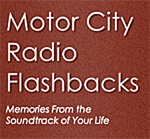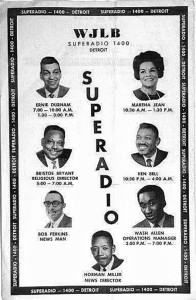 From the MCRFB NEWS archive: 1967
From the MCRFB NEWS archive: 1967
DETROIT — WJLB, Booth Broadcasting’s 1,000-watt r &b operation here, has just launched a new programming policy centering around tighter production, faster pacing, and a new set of custom jingles by Quincy Jones.

Wash Allen, who just recently took over WJLB program director duties after being transferred from Booth’s WABQ in Cleveland, said the Detroit station would be “running with a full-blast, exciting young sound.” Playlist will be 40 records, to which he will add as necessity demands. “You can never tell how many good tunes will come out in a good week, but I think the average will be about five new records a week.” he said.
The aim will be to establish consistency in programming, Allen said. He felt his philosophy in programming was the same as Bill Drake, consultant to RKO General stations, and Paul Drew, program director of CKLW in Detroit.
“Certain top tunes must be played consistently and deejays must be consistent in their shows. One deejay can’t make a station; it has to be a total operation and this is a new concept in r &b radio. In the old days, one guy could make a station, he could make a record. It can’t be like that today.”
Things are changing so fast in radio, especially in r &b radio, that Allen felt many older deejays were finding it difficult to grasp what was happening. “To some extent,’ Allen said “it was necessary to teach radio to these Mitch Miller
people. It wasn’t anybody’s fault that this situation developed.
It’s just that times are changing and a radio station has to move with the times.” Allen began his radio career with WVOL in Nashville while attending Tennessee State University. He had been with WABQ about two and a half years before moving to WJLB. He considers himself a “derivative of Ed Wright,” who’d been program director of WABQ prior to joining Liberty Records as head of its Minit label.
Allen wrote lyrics and produced the Jones jingles. Future plans call for psychedelic jingles. Station has brought in new equipment and is building up its
news department. In Martha Jean Steinberg and Ernie Durham, Allen felt he had two of the top air personalities of any station in the nation. “Now, with the new equipment, we have everything to work with.” END
(Information and news source: Billboard; September 23, 1967)
___
![]()
